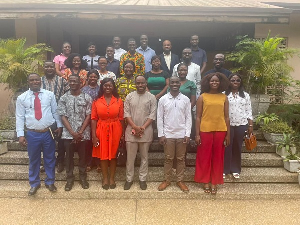 Executives captured in a photo
Executives captured in a photo
A transformative workshop took place on Thursday, bringing together civil society organizations (CSOs) in Accra under the inspiring theme: “Championing a Socially Inclusive Transition from Fossil Fuels to Green and Renewable Energy.”
Organized with support from Milieudefensie (FoE-Netherlands) and facilitated by the AbibiNsroma Foundation in collaboration with the FIDEP Foundation, the workshop aimed to empower CSOs with the necessary tools and strategies to drive Ghana’s transition to renewable energy.
At the heart of the discussions was the vital concept of a just transition—an equity-driven approach ensuring that marginalized communities are not left behind as Ghana moves away from fossil fuels.
Amos Yesutanbul, Research Director at the Frontier Institute of Development Planning (FIDEP), stressed the purpose of the gathering: “This consultative workshop unites civil society organizations to advance advocacy for a Just Energy Transition. Our aim is to secure funding from Export Credit Agencies for this vital shift, supported by the AbibiNsroma Foundation and the FIDEP Foundation.”
Participants engaged actively in interactive sessions that delved into the social, economic, and environmental dimensions of the energy transition, gaining insights into advocacy strategies, rights-based tools, and collaborative action planning.
In her keynote address, Portia Adu Mensah, Country Coordinator of 350 G-ROC, urged the audience to contextualize the just transition, particularly within the mining and oil sectors. “We must balance our country’s needs with the critical factors influencing this transition,” she asserted. “Ghana aims to address a future electricity demand of 380,000 gigawatts while diversifying our energy mix to include at least 21 gigawatts from renewable sources.”
The workshop’s objective was to deepen understanding of the just transition framework, equip CSOs with practical advocacy tools, and establish a framework for collective action. Important discussions centered around the recognition of potential negative impacts of energy transition projects on human rights and the environment, emphasizing the need for supportive measures to mitigate these effects.
Participants expressed a mix of optimism and concern regarding Ghana’s ambitious renewable energy targets. By 2030, the nation aspires for renewable sources to contribute at least 10% of its total electricity generation. While some attendees were encouraged by the government’s commitment to renewable initiatives, others expressed doubts about the feasibility of achieving these targets amid existing infrastructural and investment challenges.
One participant noted, “Realizing these goals demands not just commitment, but substantial investments in infrastructure and education. Civil society must continue to advocate for accountability in energy policies to truly achieve these ambitions.”
During the workshop’s feedback session, Dr. Derek Sarfo-Yiadom from the Climate Change & Ozone Department of the Environmental Protection Agency addressed participants’ concerns regarding the viability of Ghana’s renewable energy targets and the financial resources required. “We recognized early that achieving our objectives necessitates strategic investment; relying solely on national capacity isn’t enough,” Dr. Sarfo-Yiadom explained.
He confirmed that the government is actively pursuing funding from various international climate sources to bolster its renewable energy initiatives. “We are currently seeking financial support from bilateral partnerships and climate funds to enhance our national funding capabilities,” he said.
Dr. Sarfo-Yiadom highlighted the Prosperity Plan’s role in facilitating an equitable transition to renewable energy. “A core principle of this plan is ensuring a fair and socially inclusive transition. I appreciate your concerns, but we must accept that our economy cannot support such a significant shift without external assistance,” he cautioned participants.
His insights underscored the importance of collaboration among government entities, civil society, and international partners to effectively navigate the path to green energy. Echoing this call for teamwork, Amos Yesutanbul emphasized, “The government must recognize that partnership with civil society organizations is crucial. CSOs play a pivotal role in raising public awareness about both their own activities and government initiatives.”
As Ghana presses on towards its goal of becoming a leader in renewable energy, workshops like this underscore the necessity of collective efforts to ensure that no one is left behind in the transition to a sustainable energy future.
The proactive engagement of CSOs opens a vital pathway to advocate for policies that are socially inclusive, environmentally sound, and economically viable, ultimately paving the way for a just energy transition.
